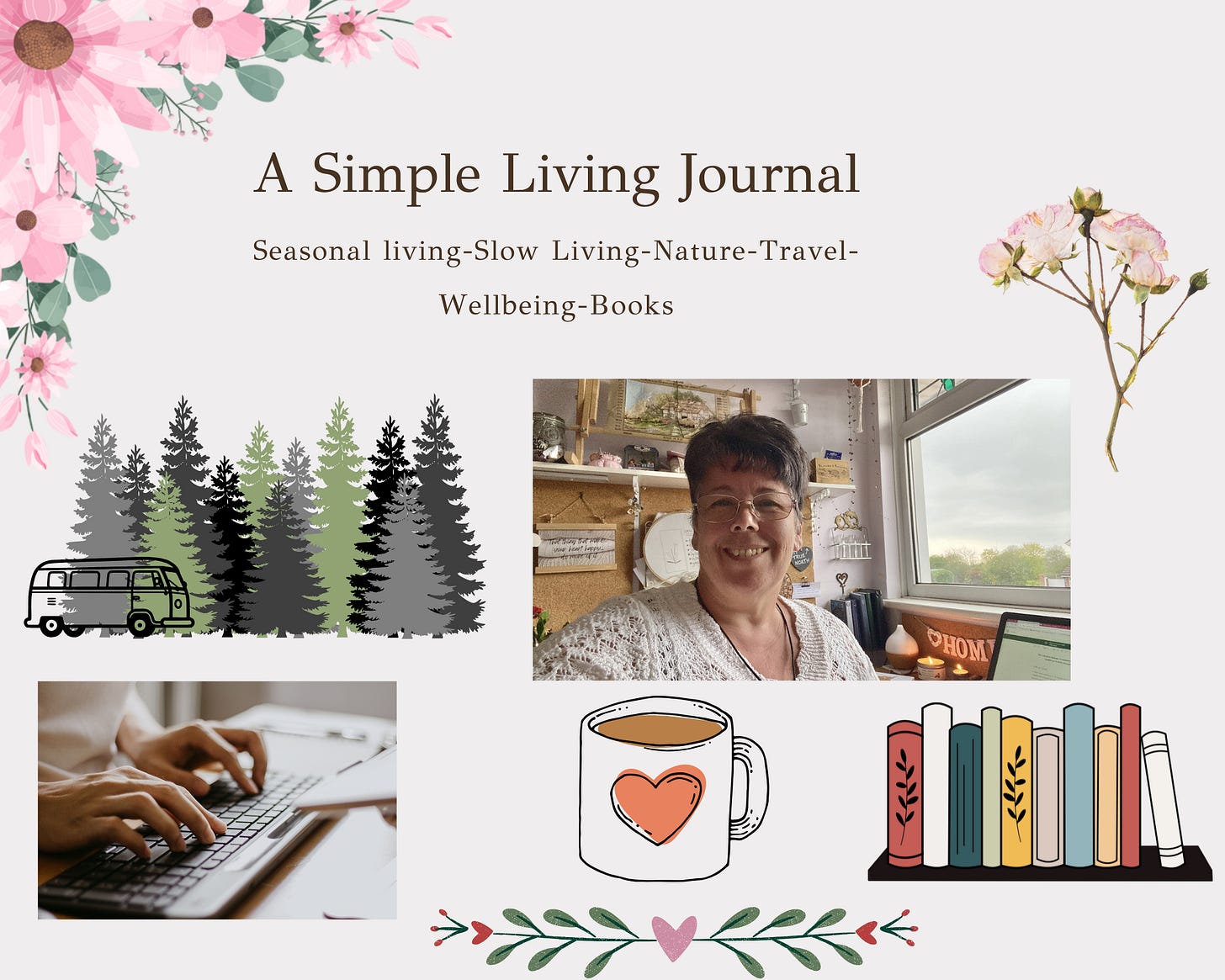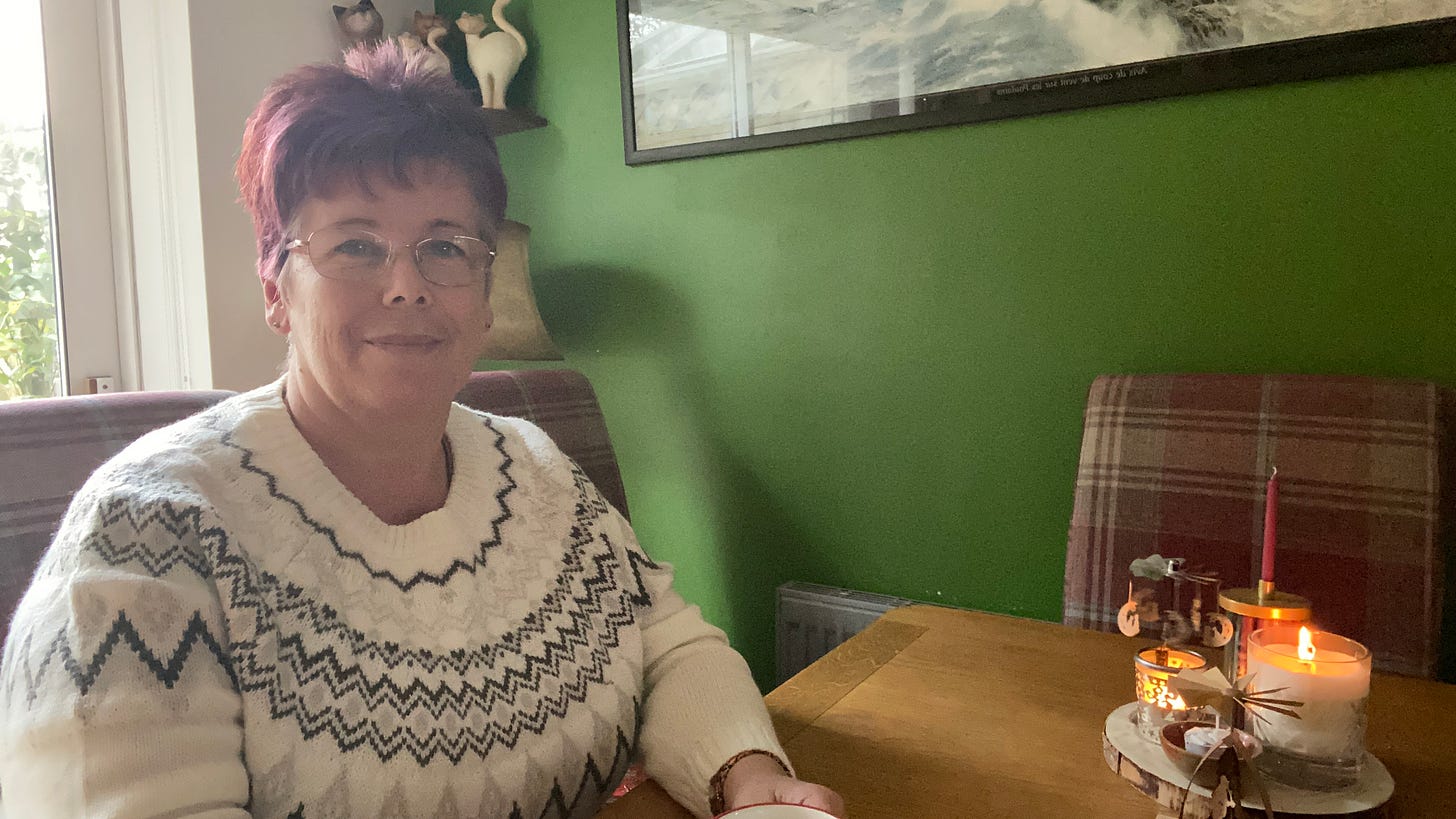Journaling for Wellbeing
Journaling at its core is simply writing by hand, pen on paper. It’s similar to the classic diary keeping but it is so much more ... 🧾🖋
A very warm welcome to A Simple Living Journal. I am pleased you are here. Make yourself a drink and cosy up in your favourite chair.
My name is Debbie. I have been writing here on Substack since September 2023 sharing snippets of my life as I continue to explore what it means to live slowly and simply. If you are curious and want to learn more why not subscribe today?
I live in the heart of England, in a small village in the south of Leicestershire. I am wife to Anthony and cat mum to our seven year old black panther called Thomas. If you want to read more click HERE
Hello my friend
Today let us talk about journaling. Journaling has become an important part of my life and I know there are many of us here that journal in one form another.
If you don’t already engage in the thought provoking world of journaling perhaps reading this will encourage you to try. I’ll offer some quick journal prompts at the end to get you started.
Journaling at its core is simply writing by hand, pen on paper. It is similar to the classic diary keeping but it is so much more.
Journaling is about self-reflection. It is a powerful tool for enhancing mental and emotional wellbeing. Journaling offers many benefits such as self-discovery, stress reduction and emotional healing. I will cover these in more detail later on.
Fill your paper with the breathings of your heart. – William Wordsworth

Journal Styles
I’d like to throw light on the different types of journaling that are available to us. Journal writing embraces varied styles, each serving a unique purpose and catering to different needs. Each style is tailored to specific experiences or interests.
Reflective Journaling. Focussing on processing experiences and emotions to gain a deeper understanding of our inner world and explore personal growth. A reflective journal is a personal record where we document our thoughts, experiences and learning. It serves several purposes, including self-reflection, critical thinking and self-assessment.
Gratitude Journal. A gratitude journal is a personal space where we can cherish and record the good things in our life, both big and small. It serves as a record of things we are thankful for, helping to enhance positive emotions and overall well-being.
By regularly writing down what we are grateful for, we can shift our focus from negative to positive experiences, encouraging resilience and a greater appreciation for life.
Bullet Journal (BuJo). A flexible, customisable and personal system for organising our life admin. Combining planning, to-do lists, goals, habit tracking and journaling. We can get creative with a bullet journal, making them as attractive and practical as we like.
Art Journaling/Visual Journaling. An art/visual journal incorporates colour, images, patterns and other materials. It is fundamentally the same thing as a written journal but it uses artwork to express a thought, emotion or idea. Some combine written word with art in their journal.
Travel Journaling. A travel journal is a personal diary that allows us to record our thoughts, feelings and experiences during our travels. It helps us to keep track of our encounters, people we met along the way, wildlife, places we visited and things we learned. It is a collection of memories, adventures and discoveries. It serves as a keepsake that we can cherish for years to come.
Dream Journaling. A dream journal is a diary in which dream experiences are recorded. A dream journal might include a record of nightly dreams, personal reflections and waking dream experiences. It is often used in the study of dreams and psychology.
Food Journaling. A food journal is an effective tool that we can use to keep track of of what we eat and drink throughout the day. Often used to improve our health.
Freewriting. Stream-of-consciousness journaling is a writing practice where we write down our thoughts as they come to mind, without worrying about structure, spelling, grammar or punctuation. This method encourages a natural flow of ideas, allowing us to explore our subconscious and gain insight into our emotions and thought patterns.
If you know of Julia Cameron's The Artist's Way you will be familiar with her Morning Pages which follows a free style of writing. Morning Pages are three pages of longhand writing done first thing in the morning. They are one of Julia's toolkits for unblocking creativity.
Nature Journaling. Not dis-similar to travel journaling, nature journaling is the process of documenting our experiences and observations in nature through writing, drawing, and other creative outlets. It encourages us to slow down and notice the details of our surroundings, encouraging a deeper appreciation for the environment. This practice can be as simple as sketching a leaf or as complex as documenting the behaviour of wildlife.
Spiritual Journaling. A spiritual journal is a space where individuals can document their spiritual journey, thoughts, feelings, and experiences. Unlike regular journaling, spiritual journaling probes deeper into one's inner landscape, exploring fears, hopes, dreams, and inspirations. This practice can take various forms, including written word, drawings, or even prayers.
Photo Journal. A photo journal documents, often daily, our experiences through picture. Like an art journal, a photo journal can also incorporate the written word.
Prompted Journal. Journal prompts are specific questions or statements that encourage self-reflection and thought. Think of them as gateways to our inner world, windows that provide a focused view of a particular area of our life, thoughts, emotions, or memories.
Memory Journal. These are journals designed for us to record our memories, experience and reflections. They can serve as a keepsake for personal growth, travel experiences or significant life events.
Junk Journal. This is a creative practice that involves using various collected materials that might otherwise be discarded to create a unique personal journal.
Just a few of the many different types of journal we can choose from. I would love to know the journal type you currently use and which ones you have used before. If you haven’t kept a journal before, which are you drawn to?

We’ve talked about the different styles of journal one can use, now lets chat about the benefits of journaling.
The benefits of journaling
Journaling offers a multitude of benefits for mental and emotional well-being including stress reduction, improved emotional health and enhanced self-awareness. It can also boost creativity, improve memory and even contribute to better sleep.
Here’s a more detailed look at some of the benefits.
Stress and Anxiety Reduction/Improved Mood. Journaling provides an outlet for processing negative emotions, which can help reduce stress and anxiety levels. By writing about emotions, we can better understand and manage them, leading to increased emotional stability. Expressing emotions and identifying triggers can lead to a more positive outlook and improved mood.
Increased Self-Awareness. Journaling encourages reflection on thoughts and feelings, fostering a deeper understanding of ourselves and our patterns. Using journal prompts can help us to delve a little deeper into our inner landscape. There are lots of prompts available on the internet, or you can choose from the list I’ve created for you below.
Better Sleep. Journaling can help quieten the mind before bedtime, promoting relaxation and better sleep quality. How often do we go to bed with our minds racing with problems and to-do lists etc. Release them from your mind by writing it all down in your journal.
Creative Thinking. The act of writing freely can spark creativity and problem-solving skills. Julia Cameron’s The Artist’s Way is an extremely effective tool for releasing our inner creator. Doing the stream-of-consciousness morning pages every day really does work.
Memory Improvement/Time Capsule. Reflecting on past experiences through writing can strengthen memory recall and reduce intrusive thoughts. Journals can serve as a personal memoir, allowing us to look back and remember past experiences.
Goal Setting and Achievement. Journaling can help track progress, identify obstacles and remain motivated towards achieving goals. Creating a food journal or habit tracker for example are effective tools.
Improved Cognitive Function. Journaling can help clear mental clutter, allowing for better focus and concentration on tasks.
Reduced Screen Time. If you use pen and paper, journaling can be a healthy alternative to excessive screen time, promoting relaxation and reduced eye strain. We could all do with more of this couldn’t we.
Photo by Ashlyn Ciara on Unsplash
Getting Started with Journaling
Starting a journal can feel really intimidating to begin with so here are a few simple steps to get you going.
Create a Comfortable Space. Find a quiet and comfortable environment where you can write without distractions. This signals to your mind that it's time to focus inward, whether you are inside or outside.
Choose Your Medium. Decide whether you prefer writing by hand or typing on a digital device. Each method has its benefits, so choose what feels right for you.
Decide what to journal about. If you struggle, pick one of the prompts from below.
Set a Routine. Incorporate journaling into your daily routine if possible to make it a consistent practice. Even a few minutes a day can be beneficial.
A few points to remember.
Find the journaling techniques that work for you.
Let go of any judgments - write for your eyes only.
Keep expectations realistic.
Journal about anything that comes to mind.
Use journal prompts if that helps.
Pick your journaling tools of choice: notebook/paper and pen/pencil
In conclusion, journaling is a versatile and effective practice that can significantly enhance your well-being. By exploring your thoughts and emotions through writing, you can embark on a journey of self-discovery, emotional healing, and personal growth. Whether you are a beginner or looking to deepen your practice, journaling can be tailored to fit your needs and preferences.
And now something for you to do. As promised here are some journal prompts covering different journal styles to work on. Find a few minutes of peace and quiet and choose one or two to work through slowly.
Describe your ideal slow morning.
Write a love letter to your future self.
What are three things that made you smile this week?
What tiny routines help you to feel grounded?
List your top five summer songs and why you love them.
What is your favourite summer memory so far? Describe it in detail.
What does work-life balance look like for you and how can you achieve it?
Who inspires you and why?
What accomplishments are you most proud of so far?
How do you want your home and surroundings to feel?
What do you want to let go of to make space for growth.
What legacy or impact do you want to leave?
What would you do differently if you were not afraid of judgement or failure?
Describe walking barefoot on grass.
Capture the sound of rain on your window.
Write about a sunset over the ocean.
Let me know how you get on.
If you enjoyed todays newsletter you may be interested in the following -
In case you missed it, I started my declutter series in March. A month by month gentle process of clearing our homes and minds. I would love you to join us on this journey of discovery in Slow and Gentle Decluttering
Decluttering has been instrumental to us in finding a simple and slower path. Maybe it can for you too. Make sure you are subscribed so that you receive the next in the series on Sunday 27th July.
Until next time.
Debbie xx
Check out my bookmarks and other crafty makes on Etsy here.














Journaling is such a powerful tool - I use mine almost everyday to keep me focused and unload my mind a little.
It is right when you said it reduces screen time - if I had to journal on my phone, it would prompt me to check everything else on my phone too - keeping it pen and paper helps so much with that.
Thanks Debbie